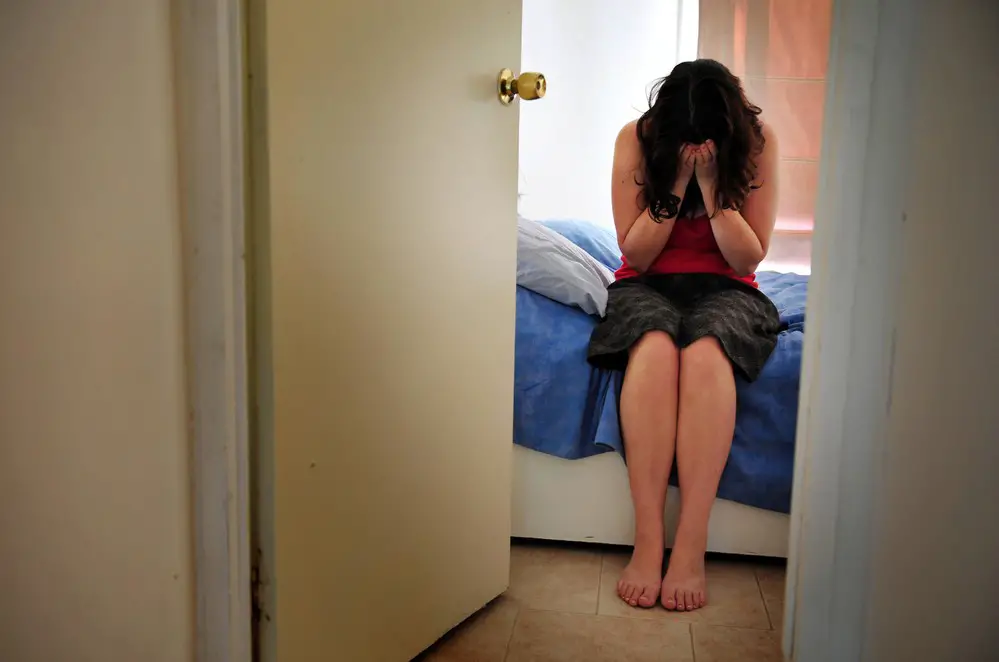As a BetterHelp affiliate, we receive compensation from BetterHelp if you purchase products or services through the links provided
Have you ever been blindsided by an event that left your world spinning? That’s acute trauma knocking at your door—a fierce and immediate response to a high-stress incident that can shake you to your core. This isn’t your everyday stress; it’s the experience that can leave its mark on your mind and body.
In this article, we’re going to take a close look at both acute and chronic trauma. What are they? How do they differ? And most importantly, what can they do to you? We’ll uncover the usual suspects that cause this overwhelming feeling and the signs that show you might be dealing with more than just a bad day.
We’ll also share some survival strategies for navigating the stormy seas of trauma, emphasize why reaching out to a professional is a game-changer, and offer tips on how you, as a loved one, can be a rock for someone who’s been through a traumatic ordeal.
Understanding trauma, its impact, and the road to recovery is crucial. Whether you’re the one in the trenches or standing by someone who is, getting the right support is key to turning the page and starting a new chapter.
 What Is Acute Trauma?
What Is Acute Trauma?
Defining Acute Trauma
Acute trauma is an intense and sudden experience that overwhelms an individual’s ability to cope effectively. It often occurs as a result of an unexpected and distressing event, such as a natural disaster, a car accident, or an act of violence.
How acute trauma is characterized by its sudden and overwhelming nature?
Acute trauma typically takes individuals by surprise, leaving them with little time to prepare for or process the distressing event.
The sudden nature of acute trauma can result in a heightened state of emotional and physiological arousal, making it distinct from other forms of trauma that develop more gradually.
Common Causes and Triggers
Common events or circumstances that can lead to acute trauma.
- Sudden Loss: The unexpected death of a loved one can feel like the ground has been yanked from under your feet, leaving you reeling and vulnerable.
- Accidents: Car crashes, work-related mishaps, or any severe accidents can shock your system into a state of trauma.
- Violent Incidents: Experiences of violence, whether as a victim or a witness, such as assaults or robberies, can etch deep traumatic grooves in your psyche.
- Natural Disasters: Earthquakes, hurricanes, floods, or any catastrophic acts of nature can trigger intense trauma with their unpredictability and sheer force.
- Medical Emergencies: Sudden and severe medical issues, like a heart attack or an unexpected diagnosis, can be traumatic, not just physically but emotionally, too.
These events can flip your world upside down in the blink of an eye, igniting a storm of emotions and reactions that can be tough to process. Recognizing these as potential sources of acute trauma is the first step in understanding and managing their profound impact on mental health.
The unexpected and intense nature of these triggers
The triggers of acute trauma are unexpected, unpredictable, and intense. These experiences can disrupt an individual’s sense of safety, stability, and normalcy, leading to a profound and immediate impact on their mental health, and professional and emotional well-being.
 Symptoms and Effects of Acute Trauma
Symptoms and Effects of Acute Trauma
Physical Symptoms
When acute trauma enters the scene, it doesn’t tiptoe—it announces its presence loudly through your body. Here’s what might happen:
- Rapid Heartbeat: Your heart starts drumming at rock concert levels, racing to pump blood to muscles that your body thinks might need to sprint or fight.
- Tense Muscles: Ever felt like a human pretzel? That’s your muscles bracing for action, getting all knotted up because your brain has sounded the alarm.
- Shallow Breathing: You might breathe like you’ve run a sprint, even if you haven’t moved an inch. It’s your body trying to get more oxygen for the “big escape”.
- Shaking: Shaking or trembling can start of nowhere as if you’re shivering in the cold, but it’s your body’s way of burning off all that adrenaline.
These are your body’s ancient reactions to danger, dialed up to eleven. They’re meant to protect you, but when the threat is psychological rather than physical, they can feel overwhelming and confusing. Understanding that these reactions are normal can be the first step in getting through the aftermath of a traumatic event.
The impact on the body and health.
When acute trauma isn’t addressed, it’s like leaving a wound untreated—it can lead to complications that affect your overall health down the line. Here’s a rundown of how that might look:
- Heart Matters: The stress that comes with trauma isn’t kind to your heart. It’s like running an engine on high all the time. This can lead to hypertension and increases the risk of heart disease.
- Stomach Upsets: Your gut is sensitive to stress. Chronic stress can stir up a storm in your digestive system, leading to issues like ulcers, indigestion, or irritable bowel syndrome (IBS).
- Immune System Down: Imagine your immune system as a security guard. If it’s always in crisis mode, it gets worn out. This makes you more vulnerable to infections and can slow down healing.
The physical aftermath of trauma isn’t just about the immediate reactions; it’s also about the long game. It’s crucial to seek help not just for the peace of mind but also for the peace of body. Finding ways to manage stress and process the trauma can help mitigate these long-term risks and lead to a healthier, more balanced life.
Emotional and Psychological Effects
Emotional and psychological consequences of acute trauma.
The emotional aftermath of acute trauma can be just as intense and disorienting as the physical symptoms. Here’s what that emotional landscape might look like:
- Fear: Like a shadow that follows you, fear can become a constant companion after a traumatic event. It can be specific to the trauma or a more general sense of dread about the world.
- Anger: This can range from mild irritation to full-blown rage. It’s a natural response to feeling threatened or hurt, and in the wake of trauma, these feelings can be amplified.
- Sadness: A profound sadness or grief can settle in, especially if the trauma involves loss. This isn’t just feeling blue—it’s a deep sorrow that can color your worldview.
- Confusion: After a traumatic event, you might feel you can’t trust your thoughts or feelings. The world can seem like a bewildering, unpredictable place.
On top of these emotions, the mind can replay the traumatic event in high definition through flashbacks or nightmares, making it feel as though it’s happening all over again. Intrusive thoughts can pop up without warning, hijacking your mind when you least expect it.
Navigating these emotional reactions is challenging, but it’s important to remember they are normal responses to abnormal events. Healing begins with acknowledging these feelings and, when ready, seeking support to work through them.
The potential long-term effects on mental health.
Here are some of the potential long-term effects of acute trauma on mental health, addressed in detail:
- Post-Traumatic Stress Disorder (PTSD): Acute trauma is a common trigger for PTSD, a mental health condition characterized by recurring and distressing flashbacks, nightmares, and intrusive thoughts related to multiple traumatic events. Individuals with PTSD may also experience heightened arousal, intense anxiety, and emotional numbing.
- Anxiety Disorders: Anxiety disorders, such as generalized anxiety disorder, social anxiety disorder, or panic disorder, may develop or worsen in response to acute stress disorder or trauma. Individuals may experience chronic worry, excessive fear, and panic attacks.
- Substance Abuse: Some individuals may turn to drugs or alcohol as a coping mechanism to numb emotional pain or distress. Sexual abuse can further exacerbate mental health challenges and lead to addiction.
Coping and Recovery
Coping Strategies
The coping mechanisms for individuals experiencing acute trauma.
Coping with acute trauma requires a combination of self-care strategies and support systems. Individuals can benefit from techniques such as mindfulness, deep breathing, and relaxation exercises.
Additionally, engaging in therapeutic interventions like cognitive-behavioral therapy (CBT) or eye movement desensitization and reprocessing (EMDR) can be instrumental in managing trauma-related symptoms.
 Actionable steps to navigate the immediate aftermath.
Actionable steps to navigate the immediate aftermath.
Right after experiencing acute trauma, it can feel like you’re lost at sea. Here are some actionable steps to help you find your bearings and start moving toward safer shores:
- Find a Safe Space: Your number one priority is to get to a place where you feel secure, whether that’s physically or emotionally.
- Connect with Loved Ones: Reach out to someone you trust. Sharing your experience can help you process it and remind you that you’re not alone.
- Self-Care: Take care of your basic needs. This means getting enough sleep, eating well, and doing your best to establish a routine that can bring some normalcy back to your life.
- Limit Exposure: If news coverage or social media discussions about the event are triggering, it’s okay to take a break from them.
- Professional Support: Consider talking to a professional counselor or therapist specializing in trauma. They can provide guidance and coping strategies.
- Avoid Major Decisions: If possible, put off big life decisions. Trauma can cloud your judgment, making it hard to see the big picture.
- Gentle Movement: Engage in light physical activity like walking or stretching. It can help release some of the tension in your body after a traumatic event.
Remember, it’s okay to ask for help, and it’s okay to take time for yourself. Healing is not a race—it’s a journey that requires patience, support, and self-compassion.
 Seeking Professional Help
Seeking Professional Help
When acute trauma strikes, it’s like being caught in an emotional thunderstorm. The value of reaching out for professional help can’t be overstated—it’s like having a skilled guide to help you navigate the storm. Here’s how professional support can make all the difference:
The Role of Professional Help in Healing from Acute Trauma
- Expert Guidance: Therapists and counselors have the expertise to lead you through the healing process, helping you understand your reactions and providing tools to cope with them.
- Tailored Techniques: No two people experience trauma in the same way. Professionals can customize therapy to fit your unique situation, whether it’s through cognitive-behavioral therapy, EMDR, or other effective methods.
- Safe Space for Expression: Sometimes, expressing what you’ve been through can feel overwhelming. A therapist offers a safe and confidential space to share your feelings without judgment.
Recognizing When You Need Professional Help
Here are some signs that professional support might be necessary:
- Persistent Distress: If your emotional turmoil isn’t improving with time or worsening, it’s a sign you might need extra support.
- Disruption to Daily Life: When trauma starts interfering with your job, relationships, or daily activities, it’s time to reach out.
- Physical Symptoms: If you’re experiencing ongoing physical reactions to stress, like headaches, stomach issues, or sleep disturbances, professional help can be beneficial.
- Reliance on Unhealthy Coping Mechanisms: Turning to substances or harmful behaviors as a way to cope can be a red flag that you need more structured support.
- Support Groups: Besides one-on-one therapy, support groups offer the chance to connect with others who have had similar experiences. This can normalize what you’re going through and provide additional support layers.
Remember, seeking professional help is a sign of strength, not weakness. It’s about taking charge of your journey to recovery and getting the support you need to navigate through the tough times. If you’re noticing these signs in yourself or someone you care about, consider contacting a healthcare provider for advice on the next steps.
Navigating the Complex Terrain of Acute Trauma, PTSD, and C-PTSD
Understanding the nuances between acute trauma, Post-Traumatic Stress Disorder (PTSD), and Complex Post-Traumatic Stress Disorder (C-PTSD) is essential for recognizing how they impact an individual’s life and determining the most effective pathway to healing.
Acute Trauma: The Immediate Aftermath
Acute trauma is like the sudden jolt that comes from a single distressing event—think of it as the emotional equivalent of a car crash. It’s characterized by:
- Immediate Response: A direct reaction to a specific, short-lived event.
- Shock and Denial: Common initial reactions that can include numbness and disbelief.
- Short-term symptoms: Such as anxiety, sleep disturbances, or flashbacks.
Post-Traumatic Stress Disorder (PTSD): When Trauma Lingers
PTSD can develop when the acute trauma isn’t processed or resolved, and it starts to take root in your daily life. It’s marked by:
- Duration: Symptoms persist for more than a month after the trauma.
- Re-experiencing: This includes flashbacks, nightmares, and intrusive thoughts.
- Avoidance: Steering clear of reminders of the trauma.
- Hyperarousal: Feeling ‘on edge’ all the time, leading to irritability or sleep issues.
Complex Post-Traumatic Stress Disorder (C-PTSD): The Chronic Struggle
C-PTSD results from repeated or prolonged exposure to traumatic events, like ongoing abuse or captivity. It shares some symptoms with PTSD but digs deeper into the psyche:
- Extended Timeline: It arises from chronic, repetitive trauma over months or years.
- Emotional Regulation Difficulties: Includes persistent sadness, explosive anger, or suicidal thoughts.
- Altered Self-Perception: Feelings of helplessness, shame, guilt, or being completely different from others.
- Relationship Issues: Problems with trust, searching for a rescuer, or repeated victimization.
Similarities and Differences
- Shared Ground: PTSD and C-PTSD both stem from traumatic events and include symptoms like flashbacks, avoidance, and mood changes.
- Key Distinctions: The type of trauma that leads to C-PTSD is prolonged and repetitive, and it often impacts a person’s self-identity and the way they relate to others. PTSD, by contrast, can arise from a single event or short-term exposure to stressors.
Understanding these differences is crucial for effective treatment. For acute trauma and PTSD, immediate interventions can be very effective. C-PTSD often requires a more long-term, comprehensive approach, addressing deep-seated issues with identity and relationships.
If you or someone you know is grappling with the effects of any trauma, professional help can be a lighthouse in the storm—guiding toward recovery, understanding, and resilience.
Supporting Loved Ones
Loved ones can be a crucial source of support for individuals who have experienced acute trauma. In-detail guidance for friends and family on providing compassionate and practical support is essential.
It is understanding the potential emotional and psychological effects of both acute and chronic trauma after trauma.
Conclusion
In conclusion, understanding acute trauma is essential for recognizing, addressing, and seeking support for individuals who have experienced sudden and overwhelming distressing events. It is crucial to differentiate acute trauma from other forms of trauma, acknowledge its physical, emotional, and psychological effects, and provide coping strategies and professional assistance for recovery.
Frequently Asked Questions About Trauma
How is acute trauma different from chronic trauma?
Acute trauma is like a sudden storm that hits unexpectedly caused by a single, short-lived event that can leave you shaken but usually has a clear end. Chronic trauma, on the other hand, is more like a relentless, gloomy weather pattern, ongoing and repetitive, and can lead to complex emotional and behavioral conditions due to its long-term nature.
What are some immediate steps to take if I or someone I know experiences acute trauma?
If you or someone close to you has just been through a traumatic event, here are some immediate steps to take:
- Safety First: Ensure that you or the person affected is safe, away from potential harm.
- Stay Present: Offer your presence. Sometimes, just being there is the best support you can give.
- Listen: If they want to talk about what happened, listen without judgment or pressure to share.
- Professional Help: Encourage them to seek professional help. This can include therapists, counselors, or support groups.
- Self-Care: Remind them (and yourself) about the importance of self-care. Eating well, resting, and engaging in gentle activities can help the body to recover from stress.
- Follow-up: Check in on them regularly. Trauma can have a delayed reaction, and ongoing support can be a lifeline.
Remember, it’s essential to handle the aftermath of trauma with care and sensitivity. Each person’s response to trauma is unique, and there’s no one-size-fits-all solution.
Can acute trauma turn into PTSD?
Yes, acute trauma can evolve into PTSD if the symptoms persist and start to interfere with daily life. Typically, if the intense reactions to the traumatic event last for more than a month and are causing significant distress or functional impairment, it might be diagnosed as PTSD.
How can I tell if someone is experiencing C-PTSD?
C-PTSD often stems from long-term traumatic events and can be harder to identify. Signs include difficulty controlling emotions, distrust in others, feelings of emptiness or hopelessness, and persistent negative self-view. If these symptoms are present and relate to a history of prolonged trauma, it could indicate C-PTSD.
What should I do if my trauma symptoms don’t improve over time?
If your symptoms don’t improve, or if they worsen, it’s essential to seek professional help. A mental health professional can provide a proper assessment and recommend a course of treatment that may include therapy, medication, or support groups.
Are there any self-help strategies for coping with trauma?
Yes, several self-help strategies can aid in coping with trauma:
- Mindfulness and Relaxation Techniques: Practices like meditation, deep breathing, and yoga can help calm the nervous system.
- Journaling: Writing down your thoughts and feelings can be a therapeutic way to process trauma.
- Healthy Lifestyle Choices: Regular exercise, a balanced diet, and adequate sleep can improve resilience.
- Social Support: Maintaining connections with supportive friends and family can provide stability and belonging.
Is it possible to fully recover from trauma?
Recovery from trauma is possible, but it can look different for everyone. Some may find they can return to their pre-trauma well-being, while others may discover a new sense of self and purpose following their recovery journey. Ongoing support, therapy, and self-care are essential to the recovery process.
- Left Arm Pain and Anxiety: Understanding the Relationship - November 23, 2023
- Anxiety Paralysis: Coping with Overwhelming Stress - November 23, 2023
- Anxious vs. Nervous: Differentiating Emotions and Responses - November 15, 2023
This site contains affiliate links to products. We will receive a commission for purchases made through these links.


 What Is Acute Trauma?
What Is Acute Trauma? Symptoms and Effects of Acute Trauma
Symptoms and Effects of Acute Trauma
 Actionable steps to navigate the immediate aftermath.
Actionable steps to navigate the immediate aftermath. Seeking Professional Help
Seeking Professional Help
